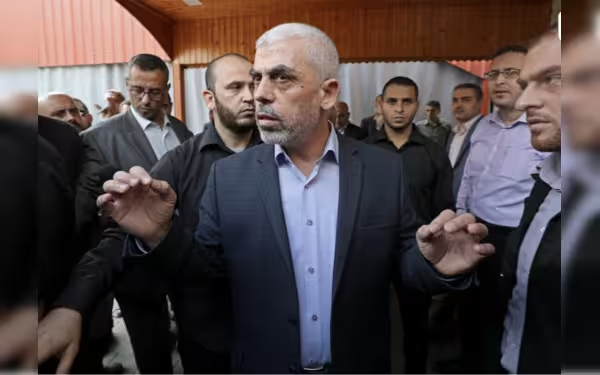Saturday, November 16, 2024 05:54 PM
Hamas and Fatah Leaders Meet for Unity Talks in Cairo
- Hamas and Fatah leaders convene in Cairo for unity discussions.
- Critical issues include Gaza administration and Israeli aggression.
- Egypt mediates to manage Gaza border crossings.
 Image Credits: arabnewspk
Image Credits: arabnewspkHamas and Fatah leaders meet in Cairo to discuss unity and Gaza administration amid ongoing conflict.
In a significant development for Palestinian politics, leaders from the Islamist group Hamas and the Fatah movement, led by Palestinian President Mahmoud Abbas, are convening in Cairo to discuss plans for cooperation following the ongoing war in Gaza. This meeting marks the first round of talks since the two factions met in China in July, where they agreed on steps to form a Palestinian unity government for both Gaza and the occupied West Bank.
The backdrop of these discussions is a long-standing division between Hamas and Fatah, which intensified when Hamas took control of Gaza in 2007 after a brief conflict with Fatah. The current talks are seen as part of a broader, albeit previously unsuccessful, effort to bridge this divide and foster unity among Palestinian factions.
The Hamas delegation is being led by Khalil Al-Hayya, the group’s second-in-command and chief negotiator based in Qatar. On the other hand, the Fatah delegation is headed by Mahmoud Al-Aloul, Fatah’s second-in-command. While there has been no immediate comment from Fatah regarding the talks, a Hamas media official, Taher Al-Nono, stated that the meeting will address critical issues, including the “Israeli aggression on the Gaza Strip” and the challenges confronting the Palestinian cause.
One of the most pressing issues on the agenda is the administration of Gaza following the year-long conflict between Israel and Hamas. Israel has made it clear that it does not trust the Abbas-led Palestinian Authority to manage the post-war administration and has ruled out Hamas's inclusion in any future governance structure. This has led to a complex situation where Palestinian factions assert that their post-war plans are an internal matter, rejecting any Israeli conditions.
A Palestinian official familiar with the discussions indicated that if a unity government cannot be established, the factions might consider forming a committee to oversee Gaza and manage its border crossings. However, the specific structure and responsibilities of this proposed committee remain uncertain.
Egypt, which has been playing a mediating role, is reportedly urging both Hamas and Fatah to agree on a mechanism to manage the border crossing with Gaza, which has been closed since May. Egyptian officials emphasize the necessity of reestablishing a Palestinian presence at the border, and discussions are ongoing with the United States regarding the border situation, alongside broader ceasefire negotiations that have currently stalled.
Before the closure in May, the Rafah crossing was the only entry point into Gaza not directly controlled by Israel, serving as a vital route for humanitarian aid and medical evacuations. For the 2.3 million residents of Gaza, it was a crucial gateway to the outside world, although movement through it has always been tightly regulated by both Egypt and Israel.
As these talks unfold, the hope for a unified Palestinian front remains a critical factor in addressing the ongoing humanitarian crisis in Gaza and the broader Palestinian struggle. The outcome of these discussions could significantly impact the future governance of Gaza and the prospects for peace in the region. The world watches closely, as the decisions made in Cairo may shape the trajectory of Palestinian unity and the quest for a lasting resolution to the conflict.













